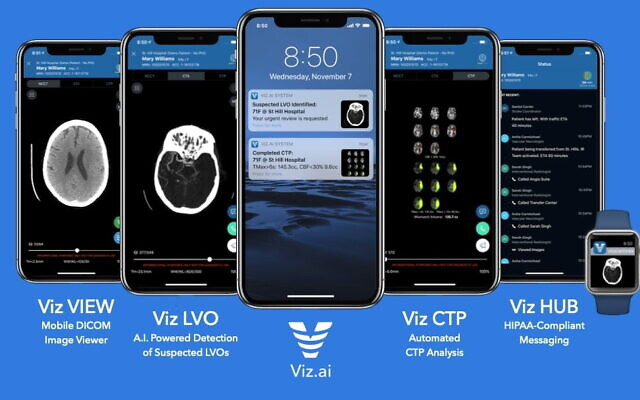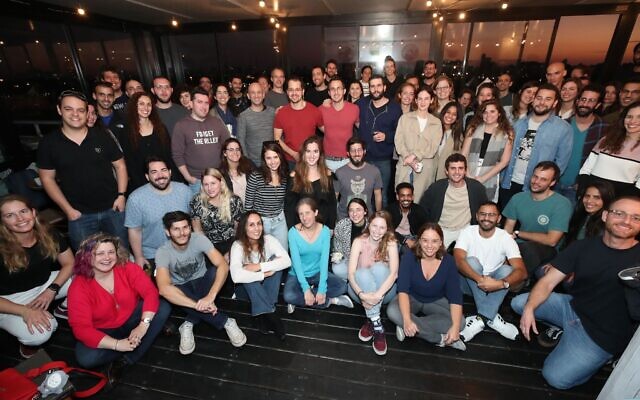Israeli startup Viz.ai nabs $100m for AI tech that detects brain conditions in scans
Series D funding led by Tiger Global and Insight Partners, both NY firms with considerable investments in Israeli startups
Ricky Ben-David is The Times of Israel’s Tech Israel editor and reporter.

Medical tech company Viz.ai, a developer of an AI-powered stroke detection and care platform, has pulled in a new investment of $100 million at a valuation of $1.2 billion, making it Israel’s newest unicorn (a private company valued at over $1 billion).
The company said Thursday that the Series D funding will be used to expand the Viz platform to detect and triage additional diseases and grow its customer base globally.
Viz.ai’s newest round was led by Tiger Global Management, a New York-based investment firm focused on software and financial tech, and Insight Partners, a VC and private equity firm also based in New York. Tiger Global has invested in Israeli companies such as cybersecurity companies Snyk and SentinelOne as well as payroll tech companies Papaya Global and HoneyBook. Insight Partners is a very active foreign investor in Israeli companies, with at least 76 local portfolio startups to its name including privacy startup PlainID, bee tech startup Beewise, and music tech startup JoyTunes.
Also joining Viz.ai’s latest round were existing investors Google Ventures and California-based Scale Ventures, among others.
Founded in 2016, Viz.ai developed a medical imaging platform that leverages AI algorithms and machine learning applications to accelerate diagnosis and care for a variety of diseases and conditions in hospitals and health systems. The company’s primary focus was on identifying Large Vessel Occlusion (LVO) strokes in medical imaging and alerting physicians of the early signs so rapid care could be administered. LVO strokes are blockages of the proximal intracranial anterior and posterior circulation that account for approximately 24% to 46% of acute ischemic strokes, serious conditions that require prompt care to prevent lasting brain damage and long-term disability.
The company has a CE mark and an FDA De Novo classification (given to novel medical devices with reasonable assurances for safety and effectiveness) for its stroke care platform. Viz.ai has also developed a number of other detection technologies including for cerebral aneurysms, the ballooning of blood vessels in the brain which can rupture and cause death, and for which it has FDA 510(k) clearance, pulmonary embolisms, and aortic diseases. It is awaiting FDA clearance for its detection tech for subdural hematoma, a buildup of blood on the surface of the brain.

The startup says that, overall, its technologies assist in the “care of one patient every 34 seconds” through its work with hospitals, health systems, and life science companies in the US. It has also been named on a number of round-ups listing innovative global startups including CB Insights’ 150 “most promising” digital health startups and Fast Company’s “most innovative” firms in 2020.
The company, co-founded by David Golan, CEO, and Chris Mansi, CEO, is based in San Francisco and has offices in Tel Aviv and Amsterdam with about 350 employees worldwide. It has raised $250 million with investors, including the latest round.
“Viz.ai is committed to helping patients get better, faster, and more equitable access to life-saving treatments,” said Mansi, who is also a medical doctor by trade. “We will continue to invest heavily in cutting edge technology and services to integrate deeply into the clinical workflow, allowing us to automate disease detection, increase diagnostic rate and enhance workflow across an entire hub and spoke health system.”
“More patients receive the right treatment, resulting in better patient outcomes and improved financial efficiency for the health system,” he added.
John Curtius, a partner at Tiger Global, said Viz.ai was a “stand out AI healthcare company” in the US.
“They are first-in-class in intelligent care coordination, with a solid foundation of clinical evidence supporting the value delivered to healthcare providers and patients. We see enormous upside as the company expands to help life science companies expedite clinical trials and accelerate patient access to new effective treatments,” said Curtius.

Viz.ai is one of over 450 Israeli digital health companies that raised about the same amount in the first quarter of 2021 as in all of 2020, and were set to close the year with record funding. Israel is home to about 480 startups and companies in digital health, a sector that drew record funding in 2021 with more investments expected in 2022.
It is also one of a number of leading Israeli medical imaging tech companies including Zebra Medical (bought in 2021 by Nanox), Aidoc, and DiA Imaging Analysis.









